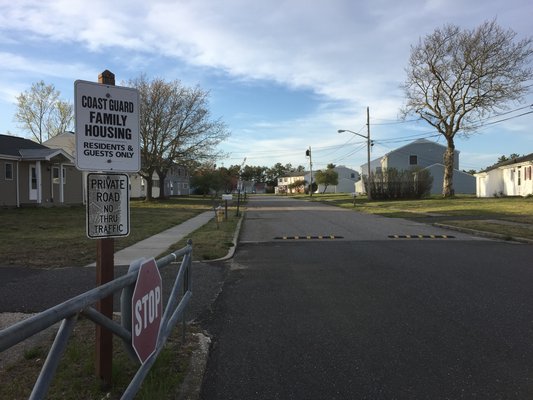
Dozens of homes owned by the U.S. Coast Guard in the Hampton West Estates neighborhood, located just west of Gabreski Airport in Westhampton Beach, are expected to be auctioned off as many of the 52 existing homes, which are intended for military staff housing, are sitting vacant.
Only 23 of the residences in the Coast Guard housing section of Hampton West Estates, a 227-home development, are currently occupied, as many service members prefer to take a military housing stipend and rent a home on the open market instead.
The pending auction—and the uncertainty of what will happen to the homes after the sale—has some nearby residents worried about the neighborhood.
According to Katie Vincentz, a spokeswoman for U.S. Representative Lee Zeldin, five parcels of land, 12 duplexes and 25 homes will be auctioned off by the General Services Administration, a government organization that manages government-owned buildings throughout the country.
Current Coast Guard residents will be allowed to remain in their rentals, she said. “The Coast Guard homes are vacant, and no one is being forced to move,” Ms. Vincentz said. “This auction is taking place in accordance with the same surplus procedures the U.S. government follows nationwide.”
The auction, which will be conducted entirely online, has yet to be scheduled but is expected to be held during the early summer. It is unclear if properties will be sold individually or in a block sale. As of this week, there was still no listing on the GSA auction website.
According to Cathy Menzies, a spokeswoman for the GSA, the property is still under the control of the Coast Guard. “The U.S. Coast Guard is still in the process of conducting its due diligence and finalizing the terms and conditions of the sale,” she said.
Representatives from the Coast Guard did not return phone calls this week.
Some residents living in the privately owned properties adjacent to the Coast Guard housing, located to the south of Stuart Avenue, say they are alarmed by the idea of a public auction and concerned that the sale of the military housing could convert them to rentals owned by absentee landlords.
“This neighborhood has been through a lot over the years,” said Forest Markowitz, the president of the Hampton West Estates Residents Association Board of Directors. “In the last 10 years, it really picked itself up and became a solid, middle-class, working-class neighborhood. We don’t want rentals. Rentals have been a problem here, and absentee landlords have really hurt us. If you get 14 rentals, it may revert to the bad old days.”
Mr. Markowitz described a period in the 1980s when many homes in the development were rented through the federally subsidized Section 8 housing program. According to Mr. Markowitz, who bought his house in 1979, the neighborhood struggled with crime and “was not a nice place to be for a while.”
Most of the now privately owned homes were originally built in the 1950s by the Air Force. After the base closed in 1969, the Air Force sold the homes to A.G. Proctor Inc., a firm based in Georgia. Most of the properties were sold individually, but in the late 1970s, about 30 properties were auctioned off.
At the time, many of the original residents moved away, because the area experienced an influx of absentee landlords—including some who neglected to care for their properties. The neighborhood later became a popular weekend party place, Mr. Markowitz said.
Over the years, the neighborhood experienced ups-and-downs. In more recent years, low property taxes attracted growing families, and Mr. Markowitz, a former New York City attorney, said the area currently is “in the best place I’ve ever seen.”
Given the fear of the neighborhood reverting back to earlier times, Mr. Markowitz is fighting to get the GSA to sell the vacant Coast Guard homes to locals looking to become homeowners. Absentee landlords could be discouraged by implementing rentals permitting, he said, as well as occupancy-based zoning ordinances.
The vacancies began several years ago when servicemen and women started renting homes in the local market, using a monthly military housing stipend known as a Basic Allowance for Housing. Stipend amounts vary depending on a service member’s pay grade, duty location and dependency status, but, on average, range from $2,000 to $4,000 monthly in the Westhampton Beach area.
Tim Batterson, a U.S. Coast Guard Boatswain’s Mate, who works at the Shinnecock Station and the East Moriches Station, lived in the Coast Guard housing at the Hampton West Estates for 10 months in 2011. According to Mr. Batterson, it is more common for Coast Guard personnel to rent local homes than to live in Coast Guard housing developments.
“You have to live in Coast Guard housing when you first report, unless you have a family. But, once you get fully qualified, you’re allowed to move out and live in a house on the market,” he said. “I don’t know anyone who lives in the Coast Guard homes anymore—they all rent houses on the market.”
Discussions about selling the surplus homes initially began in 2012, when 36 of the 52 houses were empty. In 2012, a deed swap with landowners near Coast Guard stations in Connecticut and selling the homes to private buyers were two options that were considered.
“We’ve been aware and worried about it for some time,” Mr. Markowitz said, noting that he was initially told that 14 homes would be auctioned off this year, but more recently said he heard rumors that all of the 52 houses could be sold.
For Erin Llamas, who lives on Stuart Avenue just across the street from the vacant homes, the thought of opening up the properties for public sale is a worrying one.
“It’s been so empty for so long—it’s scary to open the doors to strangers,” Ms. Llamas said. “For there to be such a big change, it might change the dynamic of the neighborhood. Who knows? We’ll see.”